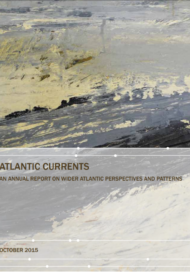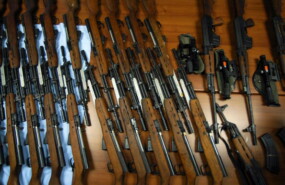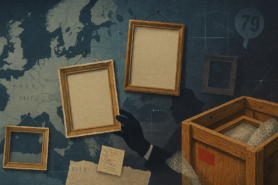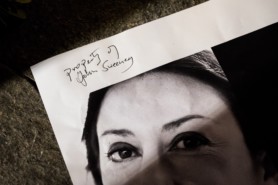Posted on 03 May 2016
Head of the Secretariat, Tuesday Reitano, was interviewed by José-Fernando Costa Pereira of the European External Action Service for their Newsletter of EU – African affairs (No 5, April 2016).
1. Shall we start with the root causes of organised crime in Africa? In the title of a conference you are about to hold after this interview, there is the word “fragility”. Can we consider that is the root cause of organised crime in Africa?
Tuesday Reitano: It is a big question and a difficult one to answer. Obviously the continent of Africa comprises 54 states and the forms of organised crime have many different dimensions and dynamics. In Africa you see everything from crimes driven by natural resource extraction, which is what people tend to think of first, through illicit trafficking in various illegal substances, drugs, arms to other forms of illicit trade that are more ambiguous, normally legal goods such as medicines, tobacco, luxury goods or cars, as well as some of the more emerging types of crime: cybercrime, for example, is highly prevalent in Africa, in particular in West Africa.
Due to the diverse nature of crime types, it is not easy to say “these are the root causes of organised crime in Africa”. What we have seen, however, is that there are three distinct phases in the way organised crime has evolved in the Continent. Natural resources-driven crime emerged first, particularly in the post-colonial period when foreign facilitators helped to remove illicit goods from the Continent and gave access to international markets and often this involved a relative degree of complicity with state actors and was often state-endorsed. The second phase followed the end of the Cold War, when organised crime became deeply interwoven with conflicts in Central and West Africa.
The fragile states that remained after this period attracted global trafficking flows of the more illegal varieties – most namely drug trafficking. These in turn became interwoven with traditional forms of cross-border smuggling, for example, across the Saharan belt from East to West where mobility, nomadism is very prevalent and traditional livelihoods were breaking down. The final phase has seen the growth and internationalisation of Africa’s role in the global illicit economy – firstly through emerging crimes such as cybercrime, but also more proactive engagement by African actors in global supply chains of illicit goods.
2. You referred to areas where on to of organised crime there has been lately an upsurge of terrorist activities. Many people speak about a link between the resources obtained by organised crime and those terrorist activities. Do you have any evidence that this is the case?
Tuesday Reitano: Yes and no! First of all, to say that there was an upsurge of terrorism in Africa is not entirely true. African incidents of terror are longstanding, and it is a Westphalian tendency to talk about African terrorism being a new thing. The foundations of a group like AQIM, for example, came from national insurgent groups who used terrorist techniques in Algeria and they spread their activities further south as Algeria began to crack down on those groups domestically. So, certainly domestic terror in Africa is a longstanding phenomenon. What is perhaps relatively new in the last decade or so, is that the focus of the terrorists is more international targets. Yet, even in this case, it still feels like a very domestic phenomenon in many ways. I recently returned from a visit to Mali, Mauritania and Niger. You talk to the national governments and they tell you (similarly in Nigeria) that the focus of the terrorist groups is increasingly domestic. It is focused on grievances, it is focused on ideologies, and it is focused on desires for independence from minority groups. The focus of the presentation I will make this morning for the German Marshall Fund, “Atlantic Currents and their Illicit Undertow: Fragile States and Transnational Security Implications” examines the role of minority tribes in the Sahel that traffic drugs and smuggle migrants, and their capacity to destabilise not only the states in Sahara but also further afield. I would not say that organised crime and terrorism has converged in Africa, but that there is a transactional relationship based the ability to control territory.
What you see in organised crime is that while the flows may be transnational the control over them is very local. For example, the drug cartels moving cocaine from Latin America through West Africa rely on African groups to enable the flow, to put in place the local corruption networks that will ensure the safe passing of the product. Interestingly enough, that is particularly true in the cocaine trade, because cocaine lifespan is very short. Unlike heroin which can be warehoused for twenty years, if you cocaine does not reach its market within a year and a half the product is no longer “fun”. So, traffickers need a guarantee that their product moves very quickly, and will seek a group with connections with key security actors, customs officials, who will pass that drug by without incidents and if it gets stopped it will be again moved and released from justice system as quickly as possible.
Where this intersects with terrorist groups is not the physical movement of commodities. Instead, it is the fact that it is often terrorist groups who have managed to establish a zone of protection and control around a specific territory and they tax everything that goes through whether it is legitimate or illegitimate. For example, Boko Haram has a very clear protection policy: this is classic mafia behaviour known as protectionism. They will go to communities, they count houses and they tax them based on the village as a whole. You pay 30 dollars per house; this is the tax they elicit for not burning the village (though sometimes they burn the village anyway just to keep everybody in their toes). In the Sahel/Sahara it is the same principle. A percentage or a cost per head or a cost per truck is taken off the commodities by the groups that control the region. In that way, if there is an Islamic terrorist group or a jihadist group that controls a particular territory, they can tax the trade – whether it is drug trafficking or migrant smuggling – but they are not directly involved in the trafficking themselves. There is much ambiguity in these groups, who is a terrorist, who is a trafficker and who, frankly, is a politician. You can play with those ambiguities but it does not much change the concrete responses.
3. So, how do we deal with the issue? Is it a question of governance? Are there any other measures that can be taken to reduce the weight of organised crime?
Tuesday Reitano: Difficult to say (laughs). There is a default response that when you think of organised crime, or when you think of terrorism, the response is a criminal justice one. The instinct is that we look at a law enforcement issue, it is a border control issue so we reinforce the capacity of national law-enforcement and we strengthen border control and then we will solve the problem of organised crime.
First of all, this does not work particularly well anywhere, even in the strongest of states. You can stop and even interdict products but you can’t actually stop them unless you address the conditions in source countries and the demand in destination countries. Major seizures, major interdictions will give you some rough approximation of what transits through and will make law-enforcement more effective but won’t stop the products, it will just displace them to more vulnerable ground. In Africa we are talking about huge countries with enormously long borders, and there is not a credible way to physically stop people smuggling. In particular in the Sahel/Sahara region, as well as in West and Central Africa, these are fragile states whose own reach is very limited beyond major cities and certainly not to the border areas, I don’t think you can credibly talk about either law-enforcement or border control and I have heard that as much from national law-enforcement people and heads of security institutions in the region. The EU, for instance, invests in building rapid response capacity of law enforcement in Mali and Niger but how rapidly can you respond to something that will take you nine days to drive to? New and more holistic approaches are needed. Corruption has become increasingly important in facilitating the flow of illicit goods, illicit trade and organised crime. There has become an increased inter-dependence between the ability to be an effective trafficker and the ability to have the necessary influence over the political and security institutions of the countries.
What we have seen is that the level of corruption that is required is pretty much commensurate to the value of the trade. For low-value, low-interest goods, hashish being one, smuggling of migrants being another, low-stigmatised activities nobody is very interested, the penalty is small. The level of corruption is transactional, it is with local police, it is with local security institutions, they pay the bribes and off it goes. When you start looking at high-value goods – cocaine, heroin or methamphetamines – the ones that are, frankly, of higher interest for the international community then the cost of corruption is very high. It is far easier for international trafficking groups hoping to move a product through a region to corrupt at the top and assume that the top will take care of the bottom than to pay little bribes all the way up. So, you see different levels of corruption engaging. If we focus particularly in the trafficking of cocaine, these things become political questions.
I think that issues of corruption and elite protection of organised crime and illicit trafficking are insufficiently integrated into the political actions we take as the international community, particularly when we are talking about unconstitutional changes of government, when we are talking about state failure. We don’t build enough safeguards against this kind of elite illicit corruption networks that facilitate organised crime and illicit trade. Similarly, in post-conflict scenarios such as in Mali or in Libya now, the engagement of political actors and the parties to the conflict in illicit trafficking is not on the table as an issue.
In general, I think the international community has a tendency to put the blinkers on when they talk about illegal things. Even if you look at the way that international trade regime addresses illicit trade: it doesn’t! All of our international trade regimes focus on licit trade, they don’t even account for illicit trade. For example, when the UK statistical division decided to recalculate GDP to include money spent on illicit activities drugs or the sex trade, the size of GDP grew by 7% – equivalent to the size of the country’s agricultural sector. When Italy did the same thing, the economy grew by 18%. It is really quite remarkable this part of an economy that we tend to ignore.
Africa is different because these countries already have large informal economies – 60 to 80 % within some countries in West Africa, for example – with a significant proportion of transactions occurring outside of the formal financial system and the regulatory framework which we will normally consider as international community. Therefore, when we invest in building a capacity of Financial Intelligence Units (FIUs) to track financial payments, we fail to capture the large amount of activity that takes place outside of this regulatory framework. I find the overwhelming focus on the strengthening of the law enforcement capacities and security institutions just meaningless. Money spent in this way sounds good, looks goods, but changes very little.
In a study I authored with colleagues from the Global Initiative for the OECD, “Illicit Financial Flows: Criminal Economies in West Africa”, which will be launched in July 2016, we concluded that a greater focus is needed on the political economy, you really need to know who are the local powerbrokers because it is moving through local power structures. The latter, they gain legitimacy from having a monopoly on violence, a monopoly on livelihoods, and a monopoly on control in areas where the state is very weak. In all of our efforts around state-building – which we do, the international community does, the EU does; we focus on elections, we focus on redressing the balance of grievances after peace-processes – we also need to consider who is profiting from illicit trafficking and trade, because they are essentially being resourced by sources of funding which give no incentive to consolidate the central state.
Download the article, “Atlantic Currents and their Illicit Undertow: Fragile States and their Transnational Security Implications”, by Tuesday Reitano and Mark Shaw below.
View a slideshow of the event, here.




